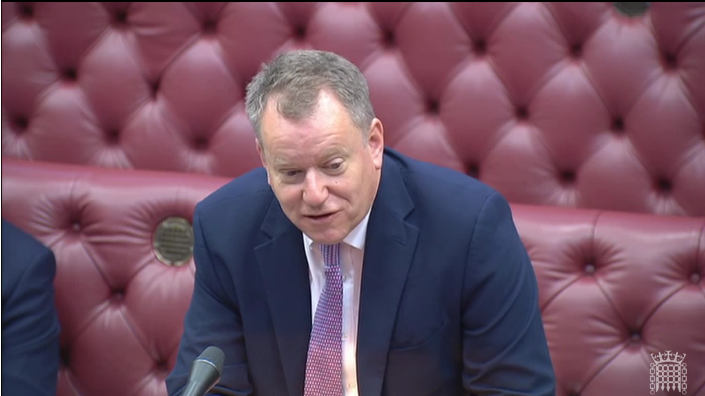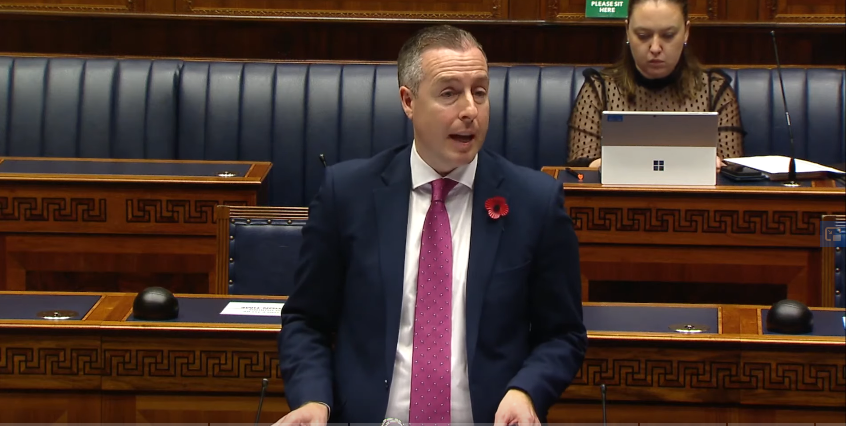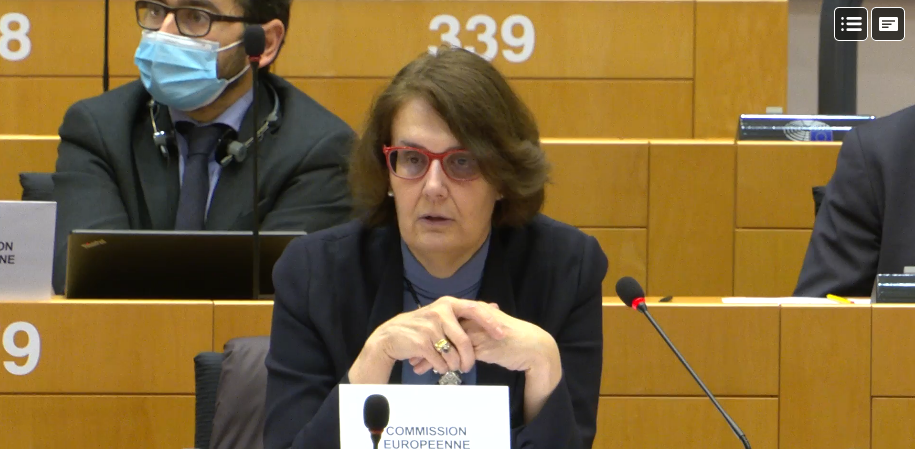Brexit & Beyond Newsletter
22 November 2021
Welcome to the 22 November 2021 Brexit & Beyond newsletter
EU-UK talks on the Protocol on Ireland/Northern Ireland continue, with chief negotiators Lord Frost and Vice-President Šefčovič both saying there is an urgency to deliver. Lord Frost visited Northern Ireland last week to engage with various stakeholders. Meanwhile, in the House of Lords, he responded to questions on the Protocol and the UK’s review of retained EU law. The Protocol and related negotiations were discussed in the Assembly, with First Minister Paul Givan taking questions. EU replacement funding was also raised with the Finance Minister. The European Parliament’s ENVI Committee was briefed by the European Commission on its proposals for the Protocol.
Frost and Šefčovič meet in Brussels
Following another week of technical talks between the EU and UK, UK Brexit Minister Lord Frost and European Commission Vice-President Maroš Šefčovič met in Brussels on Friday (19 November). This is the fifth time they have met since the recent negotiations on the Protocol’s implementation commenced. Following the meeting, a statement from Šefčovič welcomed progress on medicines, stating, “This is a real test of political goodwill.” On customs, the EU says that “there has been initial useful engagement at technical level. These discussions, which aim to significantly reduce not to eliminate customs processes, should be pursued.” On SPS controls, Šefčovič called on the UK “to reciprocate the big move made by the EU.”
Frost’s statement said that “significant gaps remain across most issues” and on medicines “there has been progress but agreement has not been reached”. On SPS and customs controls, he argues that “a durable solution here requires goods to be able to move essentially freely into Northern Ireland when both sides agree that they are remaining in Northern Ireland.” Frost, writing for the Mail on Sunday, highlighted his view of the problems with the Protocol and called for more urgency from the EU: “The current problems with the protocol go to the heart of our territorial integrity, of what it means to be one country and one market. They will not just disappear. I still hope the EU can show the ambition needed to fix the problem by agreement.” Vice-President Šefčovič appeared on the BBC’s Andrew Marr Show on Sunday, where he said, “Sometimes I feel in our meetings I am the only one pushing for urgent solutions.” The lead negotiators will meet again in London on Friday.
On 19 November, at the British-Irish Council in Cardiff, UK Minister for Intergovernmental Relations Michael Gove said, “Lord Frost has signalled that while, of course, it's always possible that Article 16 may require to be invoked, we're confident that we'll be able to make progress without it." The Telegraph has an interview with UK Trade Secretary Anne-Marie Trevelyan who says, “I don’t think anyone’s calling Article 16 before Christmas, absolutely not.”
On 18 November, Irish Minister for Foreign Affairs Simon Coveney told the Dáil, “the EU is willing to put into law, or into legal agreement, what it claims it can do to reduce the checks burden. There has been some scepticism on the British side that what Vice President Šefčovič has said the EU wants to facilitate can actually be delivered and I think the EU wants to be tested on that, which is very useful.” The EU’s October proposals suggested there could be around an 80% reduction in SPS checks and a 50% reduction in customs paperwork. RTÉ has more on the story.
Frost questioned in the Lords
UK Brexit Minister Lord Frost took questions from peers on Thursday 18 November. He was asked about the UK Government’s proposed review of retained EU law and how it will consult with stakeholders in Northern Ireland. Frost said he has launched two reviews: one on the substance of EU law, and another on its status. He said it was the responsibility of departments to consult stakeholders in NI as they review and map the content of EU law.
Lord Frost in Northern Ireland
Lord Frost visited Northern Ireland last week and met with business leaders, civil society and academics. He spoke with the BBC’s Good Morning Ulster programme during his visit. Frost told the House of Lords that he had heard “a lot of concerns about the way the protocol is being implemented” and “some concerns about the democratic legitimacy of laws being imposed without consent.”

Lord Frost answering questions on the Protocol in the House of Lords on Thursday | Source: UK Parliament
Ongoing negotiations
Frost stated that having two different systems of lawmaking within the UK “is likely to build up tension and divergence and create difficulties over time.” He said they are “trying to design a system in these negotiations that will resolve that. I wish we were making a bit more progress, but we will keep trying.” Frost said they would prefer to “reach a negotiated agreement if we can…I would not recommend any outcome from the negotiations that I did not believe safeguarded political, economic or social stability in Northern Ireland.”
Frost was asked what the benefit of triggering Article 16 to the UK position would be. He said, “it begins a new and slightly different phase if Article 16 is used, but it also creates a new reality and safeguards against some of the difficulties that we currently find. That is why it is such a relevant provision.”
Brexit at the Assembly
On Monday 15 November, Jim Allister (TUV) made a statement on the Protocol on Ireland/Northern Ireland and Article 16.
First Minister Paul Givan (DUP) was taking questions from MLAs on behalf of the Executive Office. He was asked about meetings and representations by the First Minister and deputy First Minister on the Protocol. Mr Givan said they had met Lord Frost and the Secretary of State for Northern Ireland on 22 October and 9 November, where they “raised the issues that needed to be addressed regarding the Protocol and reiterated the need for certainty.” He added that the junior Ministers in the Executive Office regularly attend ministerial Cabinet Office meetings “to ensure that our views on the protocol are heard and understood by the UK Government.”

First Minister Paul Givan responding to questions in the NI Assembly | Source: NI Assembly
Asked about access to medicines, Mr Givan said that the proposals from the EU “failed even to put forward anything in respect of veterinary medicine to provide the medicines needed to address animal welfare issues.”
The First Minister gave his view on the governance mechanisms in the Protocol and said that when he met members of the European Parliament last Monday, as when he met Maroš Šefčovič, he made the point that “the lack of democratic legitimacy of the new arrangements is not acceptable, nor should it be, for any democrat in the House who values the mandate that they have. The laws that impact upon the people of Northern Ireland should have their basis in Northern Ireland or as part of the wider UK framework from which we derive our authority. That is encapsulated through the European Court of Justice, which represents the apex of that governance arrangement. We need to see progress made in respect of the governance issues as well.”
Replacement EU funding
On Tuesday 16 November, the Minister for Finance was asked about progress on the Shared Prosperity Fund (SPF), which will replace EU structural funding. Minister Murphy said they are trying to analyse the outcome of the Community Renewal Fund, the precursor to the SPF. He said, “To be quite honest, we can see no rhyme or reason as to how the funding was allocated” and pointed out, “One of the projects was a call centre based in Oxford. I am not sure how that got funding attributed to the Executive; maybe it provides services to us. It is very unsatisfactory, and we will continue to make representation.” He said what is needed is “particularly on lost EU funding, is that the money comes to us, this institution decides the priorities, and we allocate accordingly — not the random way in which it has been done to date.”
The Minister for Finance was also asked in a written question about how the gaps in EU funding since Brexit are being met by Westminster. Minister Murphy stated that “the gaps are not being met”. He said replacement funding announced to date has been inadequate: “While we would have expected £70m per year from EU Structural Funds the only replacement for EU Structural funds expected to be operational in this financial year is the Community Renewal Fund which will provide only £12.36m.”
CBAM
In a written question, the Minister of Agriculture, Environment and Rural Affairs was asked for his assessment of the EU’s proposed Carbon Border Adjustment Mechanism (CBAM), in relation to the Protocol. [Read more about the EU’s proposal here.] The Minister responded by saying, “The EU has indicated that it considers CBAM to fall within the scope of the NI Protocol, however it is not clear how this should be applied. The potential for price divergence between the UK and EU carbon markets to trigger the imposition of the CBAM on the UK, including NI, is a matter for future negotiations between the UK Government and the EU. Under the terms of the Northern Ireland Protocol, NI electricity generating installations have remained in the EU Emissions Trading Scheme, resulting in a common carbon price across the all-island Single Electricity Market (SEM). These installations would therefore be exempt from any CBAM.”
European Parliament briefing on medicines and SPS proposals
On Thursday 18 November, the European Parliament’s Committee on the Environment, Public Health and Food Safety was briefed by the European Commission on the proposals for medicines, sanitary and phytosanitary aspects under the Ireland/Northern Ireland Protocol. Director General of DG Sante Sandra Gallina said the change in tone from the UK side is partly thanks to pressure coming from the European Parliament. Regarding medicines, Gallina highlighted that this is also an issue which affects three EU member states - Ireland, Cyprus and Malta - which have depended on supplies from the UK. She said the EU’s revision of its own legislation shows its commitment and good faith.

Director General Sandra Gallina briefing MEPs on the proposals | Source: European Union, 2021
She argued that SPS is “quite a different issue” and said that an audit has showed that the implementation of the Protocol was undermined by a lack of resources, including understaffing at border authorities. She said there is a “hole in the single market” and highlighted that the EU’s position remains that there should be full compliance with the Protocol. For meat products which are normally prohibited, Gallina said they want to see these available to be delivered in NI. She was critical about current border infrastructure and said the conditions for easements to the Protocol are safeguards, such as pre-packaging and labelling, which she considers “imminently feasible”.
Committee members raised their concerns about supply of medicines, protection of the EU single market, and ongoing uncertainty. Gallina emphasised that the Commission will never do anything to let member states and Northern Ireland go without medicines. In the long term, she said the EU’s pharma strategy will have to be addressed – essentially there is no single market for medicines today. She was positive about cooperation between EU and UK officials, saying, “at technical level we always had very good exchanges. Now, the tone is also changing slightly at political level.”
Other news
- The Lords Protocol on Ireland/Northern Ireland Sub-Committee has written to Lord Frost to raise concerns about the potential impact on the supply of medicines to Northern Ireland. The letter highlights concern among the pharmaceutical sector about the costs and operational impact of Brexit and the Protocol; the risks of withdrawal of medicine products from NI; and the impact of the grace periods and continued uncertainty in the absence of an agreed solution. It highlights technical issues raised by the sector, such as Mutual Recognition and Decentralised Procedures (DCP/MRP), and asks whether discussions with the European Commission are covering these. The Committee urges Lord Frost to continue dialogue with the industry.
- Meetings of Specialised Committees under the EU-UK Trade and Cooperation Agreement have been taking place, and minutes and agendas have been published.
- The House of Commons Library has published a briefing on the UK-EU Trade and Cooperation Agreement: Temporary business travel which explains what has changed for EU and UK businesses and individuals who travel to sell services in each other’s market.
This Week at the Assembly
- Wednesday 24 November, 12.35pm - Committee for the Economy - Departmental Written Briefing - Outcome of the European Social Fund third Call
- Wednesday 24 November, 2pm - Committee for The Executive Office - UK Exit from EU - Update from NI Assembly EU Affairs Manager; UK Exit from EU - Oral Briefing from Junior Ministers
- Thursday 25 November, 10.30am - Committee for Agriculture, Environment and Rural Affairs - ESR Report: Written Briefing - DAERA - Direct Payment to Farmers Regulations; Written Briefing from DAERA - UK-Wide SI: The Sea Fishing Amendment (No.2) Regulations 2021
Catch up with Assembly Business
- Monday 15 November, 2pm – Plenary - Question Time - The Executive Office
- Wednesday 17 November, 4pm - Committee for The Executive Office - Oral Briefing from Assembly Research: UK Approach to the Ireland/Northern Ireland Protocol




